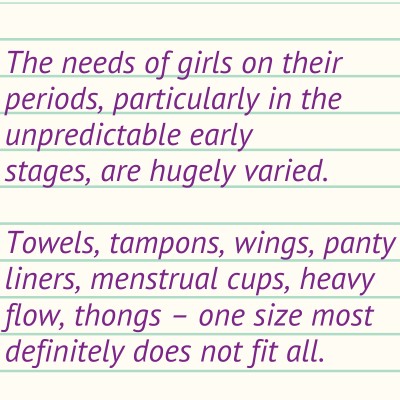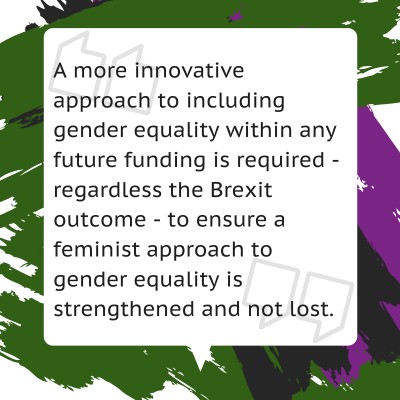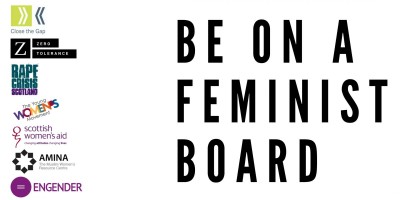Engender blog
All of Engender’s latest news. Reports, reviews, books, articles, and information from across Scotland’s women’s sector.
We would love to hear from other feminists around Scotland. Check out our guidelines for more information on how you can blog for us.
Making women safer in Scotland: the case for a standalone misogyny offence
 Today Engender has released a report calling for misogyny to be considered as a criminal offence in Scotland in order to challenge the epidemic of harassment and abuse facing women and girls.
Today Engender has released a report calling for misogyny to be considered as a criminal offence in Scotland in order to challenge the epidemic of harassment and abuse facing women and girls.
The Scottish Government is currently reviewing the law around hate crime in Scotland, and is deciding between introducing a ‘gender hostility’ aggravation - adding gender or sex to the list of characteristics already covered by hate crime legislation- and the creation of a standalone offence. Our report shows that a ‘gender hostility’ aggravation will not solve the problem of misogyny, and may in fact undermine existing policy designed to tackle domestic abuse and other forms of violence against women.
For example, a gender aggravation
might be applied to one incidence of domestic abuse, but not another,
meaning that one would be treated more seriously by the court. This is
inconsistent with feminist analysis, echoed in Equally Safe, Scotland’s violence against women strategy, which says that gender inequality is inextricably linked with violence.
Blood, cramps, and dignity - why we need free period products now
Last Wednesday, Monica Lennon MSP launched her Period Products (Free Provision) (Scotland) Bill at the Scottish Parliament. Engender's Communications and Engagement Manager, Alys Mumford, was there to show support. Here, she blogs about the importance of having free period products for everyone.

I’ve always supported the idea of free period products instinctively, and being at the launch of Monica Lennon’s Period Products (Free Provision) (Scotland) Bill really confirmed for me that it’s an issue which is vital for women and girls’ equality in Scotland.
GUEST POST: When childcare isn’t affordable, we all pay for it
-400.png)
Katie Dickerson is a New Yorker raising two strong little girls in Glasgow. She is passionate about advocating for the rights of working mothers. You can follow her on Twitter @Katie_Popple for jokes about parenting small children and rants about gender equality.
Here she blogs for Engender about why childcare costs are still a major barrier to women's equality.
I’ll admit it - when I decided to have a second child, I didn’t crunch the numbers first.
I thought about how nice it would be for my older daughter to have a sibling, and how complete my family would feel once there were four of us in it. I was so wrapped up in the warm fuzziness of it all that I didn’t consider how expensive this new kid would be.
My oldest had been attending nursery four days a week, so I was used to eye-wateringly high childcare bills. But it was only when I calculated the childcare costs for two children under five that it really hit me - nursery fees could financially ruin my family.
GUEST POST: Brexit - a risk to women's equality, or an opportunity to reshape gender mainstreaming in economic development?
In the week which has seen a further Brexit extension, we host a guest blog from Leanne Wilson, PhD Candidate at the WiSE Research Centre for Economic Justice at Glasgow Caledonian University. Leanne is feminist economist researching the effectiveness of gender mainstreaming as a strategy for advancing gender equality, specifically within the European Structural and Investment Funds and economic development policies in Scotland. You can find Leanne over on Twitter @LeanneWilson82

'Gender mainstreaming' has been an integral strategy for gender equality within the European Structural Investment Funds (ESIF) since the 2000-2006 funding period. Therefore, with Brexit looming and the risk of losing the strategy in economic development policies there is an urgency to assess its effectiveness. Gender mainstreaming was endorsed by the 1995 Fourth World Conference on Women and has continued to be the strategy of the EU in many of their policies. The UN define gender mainstreaming as “the (re)organisation, improvement, development and evaluation of policy processes, so that gender equality perspective is incorporated in all policies at all levels and at all stages, by actors normally involved in policy-making”.
It is contested as a strategy as it has been widely debated by feminist researchers for its ability to transform structural inequalities. It is argued that it involves two different structures, ‘gender equality’ and the ‘mainstream’ which are conflicting, and in some instances competing, frames. However, I fear that leaving the EU will derail any success it has had, and therefore I want to highlight any learning from the experience in Scotland which will ultimately inform successor funding. This blog discusses my early research findings and opinion on the success of the Scottish implementation of gender mainstreaming in economic development polices and, therefore, the implications post-Brexit.
Feminists in the boardroom

Governance isn't necessarily the most glamorous area of feminist activism, but it's a vital part of making change. Here our Communications and Engagement Manager, Alys Mumford, discusses why you should consider joining a board.
‘We don’t just need 50% women elected, we need 50% feminists elected’ is an oft-heard phrase when we are talking about increasing women’s participation. While frequently spoken in the context of politics, it is equally true about women on boards. And with more and more organisations striving to have gender balance on their boards (both because of the Scottish Government’s Representation on Public Boards Act and because of, y’know, equality and stuff), it’s really important that governance is seen as a feminist issue.
Downloads
 Engender Briefing: Pension Credit Entitlement Changes
From 15 May 2019, new changes will be introduced which will require couples where one partner has reached state pension age and one has not (‘mixed age couples’) to claim universal credit (UC) instead of Pension Credit.
Engender Briefing: Pension Credit Entitlement Changes
From 15 May 2019, new changes will be introduced which will require couples where one partner has reached state pension age and one has not (‘mixed age couples’) to claim universal credit (UC) instead of Pension Credit.
 Engender Parliamentary Briefing: Condemnation of Misogyny, Racism, Harassment and Sexism
Engender welcomes this Scottish Parliament Debate on Condemnation of Misogyny, Racism, Harassment and Sexism and the opportunity to raise awareness of the ways in which women in Scotland’s inequality contributes to gender-based violence.
Engender Parliamentary Briefing: Condemnation of Misogyny, Racism, Harassment and Sexism
Engender welcomes this Scottish Parliament Debate on Condemnation of Misogyny, Racism, Harassment and Sexism and the opportunity to raise awareness of the ways in which women in Scotland’s inequality contributes to gender-based violence.
 Gender Matters in Social Security: Individual Payments of Universal Credit
A paper calling on the Scottish Government to automatically split payments of Universal Credit between couples, once this power is devolved to the Scottish Parliament.
Gender Matters in Social Security: Individual Payments of Universal Credit
A paper calling on the Scottish Government to automatically split payments of Universal Credit between couples, once this power is devolved to the Scottish Parliament.
 Gender Matters Manifesto: Twenty for 2016
This manifesto sets out measures that, with political will, can be taken over the next parliamentary term in pursuit of these goals.
Gender Matters Manifesto: Twenty for 2016
This manifesto sets out measures that, with political will, can be taken over the next parliamentary term in pursuit of these goals.
 Scottish NGO Briefing for UN Special Rapporteur on Violence Against Women
Joint briefing paper for the UN Rapporteur on Violence Against Women.
Scottish NGO Briefing for UN Special Rapporteur on Violence Against Women
Joint briefing paper for the UN Rapporteur on Violence Against Women.

Newsletter
Sign up to receive our newsletter here:
Sign up to our mailing list
Receive key feminist updates direct to your inbox: